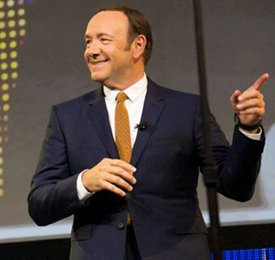 Kevin Spacey got a standing ovation when took the stage at least month’s Content Marketing Institute.
Kevin Spacey got a standing ovation when took the stage at least month’s Content Marketing Institute.
“But why was Spacey at a marketing conference, you ask? Good question,” writes Mark Jones in CMO By Adobe. “The word on the conference expo floor was: Who cares? It’s Kevin Spacey.”
Spacey’s relevance to the audience was made clear early on in his keynote address, as he starting talking to the marketers in the audience about the common goal behind what he does and what they do.
“When you strip everything away, we are all striving toward the same goal, and that is connecting with our audiences,” Spacey said.
“Storytelling” has been a buzzword in content marketing circles for a while now, yet brands are still struggling to figure out the hows behind successful yarn spinning.
Spacey was clear one point: There is a method behind the madness to successful content marketing
“Isn’t good storytelling just luck and a guessing game?” he asked. “No. Good content marketing is not a crap shoot—it has always been about the story.”
Like any good method actor, Spacey has a few tangible tips for becoming a better storyteller, which he shared with the rapt and appreciate audience. First, there must be conflict.
“Conflict creates tension and keeps people engaged, and the best stories are filled with characters that take risks and court drama,” Spacey said. “It’s the decisions that characters make in the face of these challenges that keep us glued to our seats.”
Those decisions are far more compelling when they go against the grain and take an untraditional path. “Our stories become richer, and become far more interesting, when they go against the settled order of things to achieve the unexpected,” Spacey said.
Second, choose authenticity. Spacey pointed to Volkswagen and their introduction into the American auto scene as an example of being true to who and what you are. Whatever your brand’s truth is, own up to it and forget trying to shoehorn your story into something it’s not.
Finally, understand the changing nature of your audience.
“The sheer variety of devices, platforms, and channels is transforming consumer expectations, which, in turn, impacts marketing and media landscapes,” Jones notes, and this huge impact on the way publishers produce content.
“The audience doesn’t care about the platform–they care about the content,” Spacey said. “The audience wants control, the freedom to binge. I believe we should give [them] what [they] want.”
Reminding the audience that it’s the simple truths that are the most profound, Spacey gave an insightful response to the challenge of merging creativity with commerce.
“It begins with knowing what story you want to tell,” he said. “Everything else will follow.”
